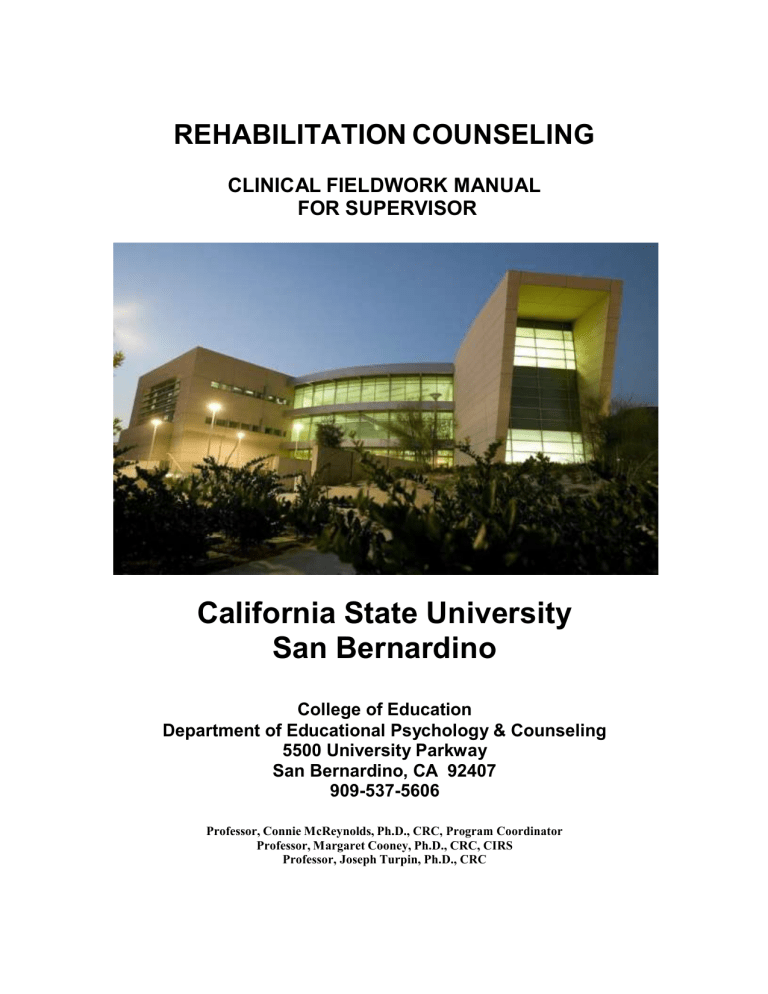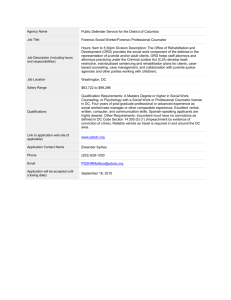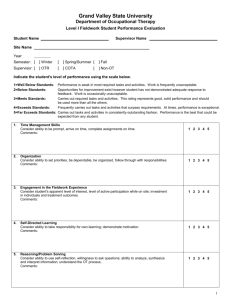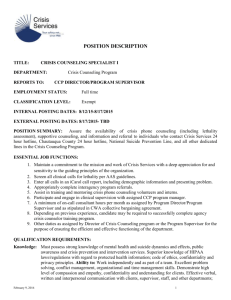Rehabilitation Counseling Fieldwork

REHABILITATION COUNSELING
CLINICAL FIELDWORK MANUAL
FOR SUPERVISOR
California State University
San Bernardino
College of Education
Department of Educational Psychology & Counseling
5500 University Parkway
San Bernardino, CA 92407
909-537-5606
Professor, Connie McReynolds, Ph.D., CRC, Program Coordinator
Professor, Margaret Cooney, Ph.D., CRC, CIRS
Professor, Joseph Turpin, Ph.D., CRC
TABLE OF CONTENTS
Letter from Coordinator to Superv isor……………………………… 1
CORE Requirements for Fieldwork Experience………………….. 2
Responsibilities of On-Site Superv isor…………………………….. 4
Contract with Agency
………………………………………………… 5
Clinical Fieldwork Description ………………………………………. 6
Clinical Evaluation
……………………………………………………. 8
General Requirements ………………………………………………. 11
Case Study Outline
…………………………………………………… 13
*Site Supervisor Evaluation..
………………………………………… 14
*Weekly Clinical Log/Time Sheet (link)…………………………….. 18
*Total Clinical Log/Time Sheet (link)
…….…………………………. 19
*On-Site Evaluation Form ……………………………………………. 20
* Items MUST be turned in at end of quarter.
Dear Supervisor:
We appreciate your taking the time to supervise one of our students in the rehabilitation counseling clinical fieldwork program at California State University,
San Bernardino. We believe this is an important contribution to both the educational process and the rehabilitation counseling profession.
We welcome your support, instruction, and evaluation of the student you are supervising. It is very important that you sign the Contract for Rehabilitation
Counseling Clinical Fieldwork that you and the student will develop stating the studen t’s function and responsibilities while at your agency. At the end of the quarter you will be asked to sign the Summary Log/Time Sheet stating the amount of time the student spent on different counseling activities while at your agency. In addition, the student will ask you to evaluate several areas of the studen t’s performance while at the agency. A careful evaluation will lead to helping the student understand areas of strengths and areas needing improvement while providing the faculty with feedback useful in program evaluation.
Please feel free to contact me, or the university supervisor, at any time if you have questions regarding the Clinical Fieldwork program at CSUSB or if you have any concerns about the student you are supervising. If you are currently a CRC, the hours that you spend in direct supervision of the student may be used as part of the maintenance hours for your continued certification. Again, your effort and support in this important phase of our educational process is greatly appreciated.
Sincerely,
Connie McReynolds, Ph.D.
Professor and Coordinator, Rehabilitation Counseling Program
Department of Educational Psychology and Counseling
College of Education
(909) 537-5453 cmreyno@csusb.edu
1
CORE REQUIREMENTS FOR
FIELDWORK EXPERIENCES
D.2 Students shall have supervised rehabilitation counseling internship activities that include a minimum of 600 hours of applied experience in an agency/program, with at least 240 hours of direct service to individuals with disabilities.
D.2.1 The internship activities shall include the following:
D.2.1.a. orientation to program components, policies and procedures, introduction to staff and their role and function, identification of the expectations for interns, confidentiality and due process procedures, risk assessment, and the Code of
Professional Ethics for Rehabilitation Counselors;
D.2.1.b. observation of all aspects of the delivery of rehabilitation counseling services, as practiced by the agency or organization, including diverse populations;
D.2.1.c. work assignments, performing the tasks required of an employed rehabilitation counselor at the agency or organization; and
D.2.1.d. reporting, including all required academic reports as well as logs, weekly progress reviews, and summaries of activities.
D.2.2 Written expectations, procedures, and policies for the internship activities shall be contained in a manual or other appropriate document(s) and distributed to students and supervisors.
D.2.3 For the internship, an on-site supervisor must be assigned to provide weekly supervision throughout the internship experience.
D.2.4 The internship shall include an evaluation of student performance, including self-evaluation by the student, the field site supervisor, and the faculty supervisor
.
D.2.5 The RCE Program shall use internship experience sites that provide rehabilitation counseling services to individuals with disabilities appropriate to the mission of the program.
D.2.6 Internship students shall have experiences that increase their awareness and understanding of differences in values, beliefs and behaviors of persons who are different from themselves. Internship shall promote cultural competence, foster personal growth, and assist students in recognizing the myriad of counseling approaches and rehabilitation issues that affect service delivery.
D.3 Internship experiences shall include an average of one (1) hour per week of individual or 1½ hours per week of group (with no more than ten students/group) supervision by a program faculty member who is a CRC or qualified individual
2
working in cooperation with a program faculty member who is a CRC.
D.3.1 When using distance education modalities, supervision may be provided using a variety of methods such as video conferencing, teleconferencing, real time video contact, or others as appropriate.
D.3.2 In states that have specific supervision requirements for counselor licensure, the program shall make the required supervision experiences consistent with the state licensure requirements and available to those students desiring to qualify for licensure.
D.3.3 There shall be a progress review of all students enrolled in an internship.
D.3.4 There shall be a written procedure for responding to students who do not demonstrate satisfactory internship knowledge or clinical skills.
D.3.5 The individual supervision of five students shall be considered equivalent to the teaching of one course due to the intensive, one-on-one instruction and the ongoing evaluation necessary in internship.
3
RESPONSIBILITIES OF ON-SITE
CLINICAL FIELDWORK SUPERVISOR
1. To discuss the Contract for Rehabilitation Counseling Clinical Fieldwork with the student, develop a plan of activities, and sign it upon completion.
2. The types of activities which are appropriate to the Clinical setting should include when possible: a. Orientation to the agency ’s program components, policies and procedures, introduction to staff and their role and function. b. Identification of the expectations of the intern. c. Observation of rehabilitation service delivery in all stages of development in the office/facility, in conferences, and in the field. d. Work Assignments - performing the tasks required of an employed rehabilitation counselor in the agency from intake to discharge and/or placement and follow-up. e. Reporting - includes all required academic reports as well as logs, weekly progress reviews, and summaries of client activities. f. Evaluation - includes self-evaluation by the student, an independent evaluation by the on-site supervisor, and the academic evaluation by the university supervisor.
2. To supervise the studen t’s activities in the organization where the student is completing the clinical fieldwork experience.
3. To notify the university supervisor of any serious concerns/problems the student may have while completing the clinical fieldwork experience.
4. To verify the summary log sheet relating to the student ’s experience.
5. To meet with the student to discuss his/her rehabilitation counseling development at the agency.
6. To discuss the student ’s rehabilitation counseling development with the university supervisor.
7. To evaluate the studen t’s rehabilitation counseling development to include: counseling skills, clinical fieldwork activities, and student / professional dispositions.
4
CONTRACT FOR REHABILITATION COUNSELING
CLINICAL FIELDWORK
Date: _______________
Studen t’s Name _____________________________________________________
Address: ___________________________________________________________
Primary Phone: ___________________ Secondary Phone: ____________
The following activities and timetables for completion during the quarter have been discussed and mutually agreed upon by my on-site supervisor and myself.
My responsibilities and/or functions at the agency are as follows:
Signature of student Date
Name of on-site Supervisor (Printed)
Signature of On-Site Supervisor Date
5
Clinical Fieldwork Description
California State University, San Bernardino
The Council on Rehabilitation Education requires that each student complete a minimum of 600 hours in rehabilitation counseling (240 hours of one-on-one individual counseling) at an agency site. The additional activities shall include, but not be limited to, the following components:
1. Orientation to the agency
’s program components, policies and procedures, introduction to staff and their role and function; identification of the expectations for the interns.
2. Observation of rehabilitation service delivery in all stages of development – in the office/facility, in conferences and in the field;
3. Work Assignments
– performing the tasks required of an employed rehabilitation counselor in the agency from intake to discharge and/or placement;
4. Reporting – includes all required academic reports as well as longs, weekly progress reviews and summaries of client activities;
5. Evaluation – includes self-evaluation by the student, and supervisor and academic evaluation by the university supervisor.
Students will complete their fieldwork in clinical sites which provide services to individuals with disabilities. According to the CORE Manual, suggested sites where the student may complete their clinical fieldwork are as follows:
1. State offices of rehabilitation, commission for the blind or developmental disabilities;
2. Vocationally oriented facilities;
3. State training schools and rehabilitation centers;
4. Medical hospitals- medical rehabilitation;
5. Psychiatric hospitals;
6. Community mental health clinics;
7. Correctional institutions;
8. Drug and alcohol settings;
9. Agencies for the culturally (economically) disadvantaged;
10. Consumer organizations;
11. Institutions for the aging;
12. Independent living centers and/or agencies;
13. Private, for profit agencies;
14. University and college offices for individuals with disabilities and
Affirmative Action; Special Services for students with disabilities;
15. Rehabilitation units of larger entities, (e.g., Workers Compensation,
Railroads, Public Utilities, VA Hospitals, Dept. of Labor, etc.)
6
Clinical Fieldwork is a culminating process in which students are encouraged to complete their clinical experience near the end of their program of study. Further, students are encouraged to have as wide a variety of experiences as possible within this clinical area.
Students who have returned to school and are currently working on a full-time bases in the rehabilitation field, will be allowed to use their work-based experiences for one quarter of the three required. For the additional two quarters, the fieldwork program must include a minimum of 50 hours each quarter completed away from the regular work responsibility. This does not remove the requirement of all fieldwork students to have 80 hours of one-on-one counseling each quarter.
7
CLINICAL EVALUATION
EREH 679
The supervision and evaluation of the student during clinical fieldwork is the responsibility of the university supervisor in consultation with the on-site supervisor and the student. The on-site supervisor has an important role in the evaluation process and subsequently, close cooperation between the university and on-site supervisor is needed. All on-site supervisors participate in a continual evaluation process of the studen t’s activities.
A student who experiences difficulties during the clinical fieldwork will meet with the on-site supervisor and the university supervisor to facilitate a resolution of the noted concerns. A student may be removed from a fieldwork site if the student is demonstrating unethical or unsound rehabilitation counseling practices or if the student is not conducting him/herself in an appropriate manner within the agency setting. This may include but not be limited to questions of tardiness, absenteeism, and general behaviors that would be reasons for dismissal as a probationary employee. Serious violations of rehabilitation counseling ethics and practices may result in the student being terminated from the CSUSB rehabilitation counseling program.
The studen t’s evaluation in Clinical Fieldwork is a Credit/No Credit mark. This allows the student the opportunity to try new ideas and concepts without fear of it negatively affecting the studen t’s grade. If a student does not submit all the course work, does not attend the prescribe number of class meetings, or fails to complete expected hours within the quarter, the university supervisor may choose to assign the mark of No Credit. A No Credit for Fieldwork will require the student to retake the clinical fieldwork course. Clinical Fieldwork hours that were completed during a quarter when a No Credit was assigned will not be carried into the new quarter. A student with a No Credit mark will be required to repeat all 200 hours except in an exceptional case.
The studen t’s grade in Clinical Fieldwork will be an evaluation of the following three areas: *
1. Rehabilitation Counseling skills and practices (50% of assigned mark)
2. Participation in seminar activities (25% of assigned mark)
3. Functioning and understanding of community rehabilitation organizations
(25% of assigned mark)
Note the conditions stated above regarding a No Credit mark being assigned.
8
The following is a listing of the competencies to be demonstrated in the stated areas of evaluation. These competencies are expected of all students. The evaluation method may vary with different university supervisors; however, the specific requirements will be assessed in the Clinical Fieldwork course.
1.
Evaluation of Rehabilitation Counseling skills and practices.
a. Student will demonstrate rehabilitation counseling ethics and an understanding of the rehabilitation counseling process. b. Student will demonstrate an understanding of the vocational implications and handicaps of different diseases and disabilities. c. Student will demonstrate an understanding of vocational planning. d. Student will demonstrate an understanding of organized casework management. e. Student will demonstrate an understanding of effective vocational evaluation. i. Selection of appropriate evaluation measures for client. ii. Ethical administration of evaluation procedures. iii. Competent scoring (where feasible) and interpretation of f. evaluation results to the client.
Student will demonstrate effective job placement skills. g. Student will demonstrate an understanding of rehabilitation organizational development activities. h. Student will demonstrate effective interviewing skills. i. Student will demonstrate sound rehabilitation counseling with clients.
Their counseling development (as appropriate) will reflect the following counseling understandings and strategies. i. The process skills of warmth, respect, empathy, and genuineness; and nonverbal physical attending skills. ii. Primary accurate empathy skills including paraphrasing content, accurate reflection of feelings, summarizing content and feelings, minimal encouragers, open leads and questions when appropriate, toleration of silences, suspension of own frame of reference. iii. Advanced accurate empathy skills including identification of themes and patterns, pulling together masses of materials, providing alternative frames of reference, recognizing polarities and discrepancies, responding to nonverbal communication, self- disclosure, immediacy, and confrontation. iv. Skills including mutual goal setting, development and elaboration of behavioral change intervention plans, monitoring of change, and assessment of planned intervention. v. Identification of client resistance and evidence of change. vi. Identification of some resistance and evidence of change. vii. Ability to critique and accurately identify strengths and weaknesses in own counseling.
9
viii. Ability to describe counseling sessions in process terminology. ix. Use of three distinctly different intervention strategies. x. Ability to initiate and terminate counseling sessions in an effective and appropriate way.
These skills will be evaluated by on-site visits by the university supervisor, course work activities, feedback from the on-site supervisor, and other related assessments that may be required dependent on the studen t’s skill level.
2. Participation in Seminar Activities
Students will be expected to attend all clinical fieldwork classes. Students who miss two or more seminars will receive a non-credit for the course or receive an incomplete and be required to attend additional seminars until the university supervisor is satisfied that all requirements have been met. a. Student will evaluate counseling development within her/himself and submit a written evaluation by the end of the quarter. b. Students will develop their own individual rehabilitation counseling identity.
3.
Community Rehabilitation Organizational Structures understanding and functioning a. The student will demonstrated knowledge of the purpose, structure, procedures, and resources of the clinical setting (case management, audio/video presentations) b. The ability to relate effectively to relevant segments of the population which would include students/clients, staff and administration (on-site observations, on-site supervisor feedback). c. The student will demonstrate understanding of role of rehabilitation counselor as change agent. d. The student demonstrates understanding of agency ’s relationship to other agencies in the community.
10
GENERAL REQUIREMENTS FOR CLINICAL
FIELDWORK IN REHABILITATION
COUNSELING EREH 679
COURSE REQUIREMENTS
1. An Individual Contract will be developed indicating the way in which the student will utilize their time in the Clinical Fieldwork experience. The contract will include: a. The student counselor ’s functions in that particular setting b. The hours to be spent in each activity c. Methods of implementation d. Dates by which various activities will be completed
2. Prior to working with clients, the student will provide verification of professional liability insurance. The student will provide a copy of the face sheet of the professional liability insurance coverage that includes policy number and dates of coverage. Professional liability insurance must be in place at the beginning of each quarter of fieldwork class.
3. A Weekly Log/Time Sheet and the Total Log/Time Sheet will be completed by the student, signed by the on-site supervisor and given to the CSUSB supervisor.
4. Each student will keep a Weekly Record of his/her activities. This journal will include the dates and times of counseling activities and a brief notation of the nature of the activity and progress reviews for each client.
5. Each student will turn in two (2) audio/video tapes which demonstrate rehabilitation counseling with two separate clients. The student will play and discuss the counseling which occurred during the student/mentor/university supervisor review session.
6. Student will prepare two (2) case studies on two separate clients. The case study will reflect: a. Reason for referral b. Social vocational history c. Vocational planning d. Services needed to complete the plan e. Overall evaluation of clien t’s progress toward successful completion
of the rehabilitation plan
7. Student will complete a self-evaluation of their rehabilitation counseling development at the end of the quarter which they will discuss with the
on-site supervisor. (See Fieldwork competencies.)
8. Student will attend and actively participate in all fieldwork seminars.
11
9. Student will demonstrate sound rehabilitation counseling ethics and practices during the Clinical Fieldwork experience.
10. Each student will turn in an evaluation from the on-site supervisor at the end of the quarter.
12
REHABILITATION COUNSELING
Case Study Outline
IDENTIFYING DATA: Name (assigned, not real), general address, age, date of birth, gender
REASON FOR REFERRAL:
DISABILITY: Nature, onset, seriousness, duration, treatment, medication, mobility, stability, hospitalization, feelings, and attitudes about the disability.
FAMILY: Brothers, sisters, stability, supportiveness, relationships between members
SOCIAL: General appearance of subject and impression made upon others, relationships with friends and community agencies, leisure time activities, living arrangements.
EDUCATION: Highest level of schooling, interests, academic skills, other training. attitude toward classroom education.
EMPLOYMENT: Work experience, work stability, work skills, job continuation, boy availability, skills, motivation for work, job seeking skills.
SUMMARY OF ASSETS:
SUMMARY OF LIMITATIONS:
CLIENT ’S STATEMENT OF PROBLEM(S): Counselor ’s perception of client’s problem(s) and their relationship to the client
’s employability.
13
California State University San Bernardino
College of Education
Department of Educational Psychology & Counseling
5500 University Parkway
San Bernardino, CA 92407
(909) 537-5453
REHABILITATION COUNSELING PROGRAM
Site Supervisor Evaluation of Fieldwork Student
Quarter/Year ________________________________________________________
Name of Student _____________________________________________________
Practicum Site _______________________________________________________
Site Supervisor Phone _________________________________________________
University Supervisor __________________________________________________
Directions: Please indicate the degree each competency has been demonstrated using the provided scale:
Definition of Rating Terms:
Excellent: Always performs above the minimum requirements and shows outstanding aptitude and application of techniques and concepts of Rehabilitation
Counseling
Good: Usually meets minimum requirements in a satisfactory manner; performs as might be expected of a Rehabilitation Counseling graduate student.
Poor: Occasionally fails to meet minimum requirements in a satisfactory manner; performs at a level somewhat below that expected of a Rehabilitation Counseling graduate student.
Not Applicable: No basis exists on which to evaluate the graduate intern.
1. Student Work Performance:
Excellent Good Poor N/A
1.1 Organizes information for records or reports
1.2 Is clear and accurate in records and
14
reports
1.3 Carries out instructions or directions
1.4 Completes assigned tasks
1.5 Plans and organizes work
1.6 Is flexible in adapting to work situations
1.7 Shows initiative in presenting and developing new ideas
1.8 Works under pressure and use personal stress management strategies
1.9 Shows skill in handling special assignments
1.10 Recognizes the importance of individual differences and diverse cultures in counseling
1.11 Knows and consistently adheres to established professional codes of ethics
1.12 Seeks opportunities for observations and to participate in agency activities, as appropriate
2. Student Response to Supervision:
Excellent
2.1 Develops a positive and respectful relationship with supervisor
2.2 Consults with supervisor for assistance;
2.3 Uses supervisory assistance in performance of work
2.4 Appropriately expresses feelings in
Good Poor N/A
15
supervisory conferences
2.5 Is prompt and prepares for conferences with supervisor
2.6 Constructively accepts praise, criticism, and ideas for improvement
3. Student Acceptance/Demonstration of Professional Role:
Excellent Good Poor
3.1 Accepts professional responsibility
3.2 Forms a positive relationship with other professionals/staff members in the agency/facility
3.3 Forms a positive relationship with other professionals in the community
3.4 Respects and follows agency/ facility policies and procedures
3.5 Demonstrates potential to make a positive professional contribution in the human services field
4. Student Counseling Skills:
Excellent Good Poor
N/A
N/A
4.1 Demonstrates the ability to communicate and apply relationship building skills
4.2 Demonstrates sensitivity to client’s needs and perceptions
4.3 Demonstrates awareness of individuality of clients
4.4 Demonstrates skill and knowledge in selecting and using effective intervention strategies appropriate to needs of the client
4.5 Demonstrates the ability to conceptualize, articulate, and defend a personally developed counseling model
4.6 Demonstrates the ability to evaluate his/her own counseling interventions
16
4.7 Demonstrates the flexibility to modify conceptualization of the counseling process as circumstances and experience dictates
4.8 Demonstrates knowledge and ability to help clients develop positive attitudes toward self and others
4.9 Demonstrates the knowledge and ability to assist individuals and groups in their development
4.10 Demonstrates the ability to interpret results from group and individual assessments
4.11 Demonstrates awareness of and sensitivity to sex and cultural biases
4.12 Demonstrates counseling skills utilizing tests, career information, and personal data
4.13 Demonstrates effectiveness in working with individuals and groups from diversity of backgrounds.
4.14 Demonstrates awareness of the counselor’s change-agent function on behalf of clients.
Demonstrates skills in the following
4.15 Group Orientation
4.16 Facilitating group movement and development
4.17 Using appropriate verbal responses
4.18 Facilitating productive group interaction
5. Would you recommend this student for a fieldwork position in your agency?
Please explain.
Studen t’s Signature Date
Date SVRC-QRP Signature, as appropriate
On-site Supervisor ’s Signature Date
17
WEEKLY CLINICAL LOG SHEET
FIELDWORK REPORTING
Click on the following link to the Rehabilitation Counseling website to access this form.
http://coe.csusb.edu/programs/rehabCounseling/documents/Fieldwork_Weekly_Hours_Wo rksheet_000.xlsx
18
TOTAL CLINICAL LOG/TIME SHEET
FIELDWORK REPORTING
Click on the following link to the Rehabilitation Counseling website to access this form.
http://coe.csusb.edu/programs/rehabCounseling/documents/QuarterFieldworkHoursWorks heet_000.xlsx
19
Visit Number
CALIFORNIA STATE UNIVERSITY, SAN BERNARDINO
REHABILITATION COUNSELING PROGRAM
ON-SITE EVALUATION FORM
Name of Student_ ________________________________________________
Field Site ________________
Type of Activity Observed _________________
On a scale of 1 to 5 (1 being low, 5 being high), would you please evaluate the student you observed. Rank your responses by circling one number from 1 to 5.
1. Ability to listen 1 2 3 4 5
2. Ability to demonstrate empathy 1 2 3 4 5
3.
4.
5.
Willingness to accept criticism
Demonstration of flexibility
Ability to work at the level of the clients at the agency
6. Ability to demonstrate rehabilitation counseling skills 1
7. Ability to meet the needs of the clients at the agency
Comments:
Signature of Observer
1
1
1
1
2
2
2
2
2
3
3
3
3
3
Date
4
4
4
4
4
5
5
5
5
5
20





